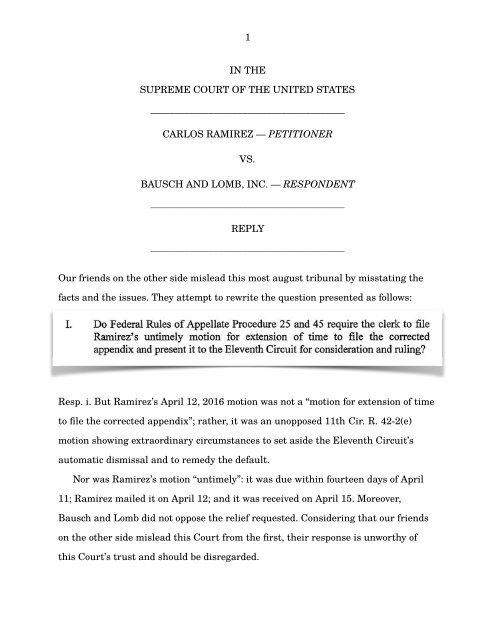Ramirez_reply2ResponseinOpposition2Petition_03-27-17
Create successful ePaper yourself
Turn your PDF publications into a flip-book with our unique Google optimized e-Paper software.
1<br />
IN THE<br />
SUPREME COURT OF THE UNITED STATES<br />
________________________________________<br />
CARLOS RAMIREZ — PETITIONER<br />
VS.<br />
BAUSCH AND LOMB, INC. — RESPONDENT<br />
________________________________________<br />
REPLY<br />
________________________________________<br />
Our friends on the other side mislead this most august tribunal by misstating the<br />
facts and the issues. They attempt to rewrite the question presented as follows:<br />
Resp. i. But <strong>Ramirez</strong>’s April 12, 2016 motion was not a “motion for extension of time<br />
to file the corrected appendix”; rather, it was an unopposed 11th Cir. R. 42-2(e)<br />
motion showing extraordinary circumstances to set aside the Eleventh Circuit’s<br />
automatic dismissal and to remedy the default.<br />
Nor was <strong>Ramirez</strong>’s motion “untimely”: it was due within fourteen days of April<br />
11; <strong>Ramirez</strong> mailed it on April 12; and it was received on April 15. Moreover,<br />
Bausch and Lomb did not oppose the relief requested. Considering that our friends<br />
on the other side mislead this Court from the first, their response is unworthy of<br />
this Court’s trust and should be disregarded.
2<br />
The crux of Bausch and Lomb’s argument is that the petition was somehow<br />
untimely,<br />
1<br />
even though Justice Thomas authorized the extension and even though<br />
the petition was filed within the time provided. See Resp. 2–3, 7–14. But even if<br />
Bausch and Lomb were able to call Justice Thomas’s order into question, as it does,<br />
<strong>Ramirez</strong>’s June 2 and August 1 pro-se motions effectively sought rehearing, and<br />
consequently the application for extension was timely because it was filed within<br />
ninety days of the order disposing of the last of those motions on September 7.<br />
See S. Ct. R. 13.3.<br />
Bausch & Lomb next argues that there are no compelling reasons to grant the<br />
petition. R. 14–15. But a court’s failure to rule on a motion duly filed pursuant to<br />
that court’s own local rules compels correction of that error.<br />
Last, Bausch & Lomb addresses the merits of the error. It argues again that<br />
<strong>Ramirez</strong>’s motion was for an extension of time.<br />
2<br />
Resp. 15–18. But <strong>Ramirez</strong> had not<br />
requested an extension of time: rather, he had filed a Local Rule 42-2(e) motion.<br />
Bausch & Lomb’s repeated mischaracterizations of the facts render its response<br />
unworthy of this Court’s credence. Bausch & Lomb then argues that 11th Cir. R.<br />
42-2 does not conflict with the Federal Rules of Appellate Procedure. Resp. 18–19.<br />
But Bausch & Lomb fails to address the arguments in the petition and its response<br />
is utterly nonsensical. See id. And, as its last attempt to avoid a ruling on <strong>Ramirez</strong>’s<br />
duly filed motion, Bausch & Lomb argues that no extraordinary circumstances were<br />
shown. Resp. 19–23. That argument is as callous as it is meritless.<br />
1<br />
In several places, Bausch and Lomb’s response pokes fun at the language in Mr. <strong>Ramirez</strong>’s<br />
pro-se court papers. E.g., Resp. 2, 8, 9, 11. But Mr. <strong>Ramirez</strong> is homeless and a non-native<br />
speaker of English. Such quibbling is unbecoming and serves no useful purpose.<br />
2<br />
Bausch & Lomb complains of the timeliness of filings in the first appeal, which Bausch &<br />
Lomb lost. Resp. 16. Bausch & Lomb is fighting yesterday’s war. And then Bausch & Lomb<br />
misstates the facts for the second time, arguing again that <strong>Ramirez</strong> supposedly had made a<br />
“second request for extension of time to file [his] … appendix[.]” Resp. 16 n. 7.
3<br />
Bausch & Lomb attempts again to mislead this Court by asserting that <strong>Ramirez</strong><br />
waited until “June 2, 2016, forty-three days later, to file a motion to reinstate the<br />
appeal.” Resp. 21. But Ramrez mailed his motion within twenty-four hours of the<br />
FedEx Kinkos employee’s unexpected error. Bausch & Lomb is playing fast and loose<br />
with the facts and not focusing on the real matter at issue. For a homeless man<br />
without access to a computer or printer of his own, a third-party vendor’s failure to<br />
properly and timely print a document according to <strong>Ramirez</strong>’s request certainly<br />
constitutes extraordinary circumstances.<br />
In sum, Bausch and Lomb asks this Court to condone the lower court’s failure to<br />
consider and rule on the motion that <strong>Ramirez</strong> duly filed according to the lower<br />
court’s local rules, and to dismiss <strong>Ramirez</strong>’s appeal in its entirety because a thirdparty<br />
vendor misprinted the appendix.<br />
This Court should reject Bausch & Lomb’s arguments and grant the relief that<br />
<strong>Ramirez</strong> has requested, which is reasonable, correct under the law, and just.<br />
Most respectfully submitted,<br />
/s/ Andrew Paul Kawel<br />
Counsel of Record for Mr. <strong>Ramirez</strong><br />
Kawel PLLC<br />
80 SW 8th St. Ste. 3330<br />
Miami, Florida 33130-3004<br />
apkawel@kawellaw.com<br />
(305) 209-4529

















